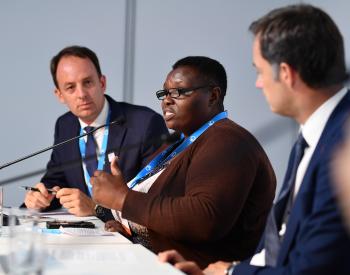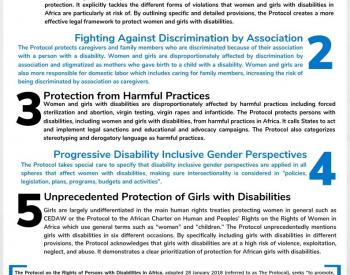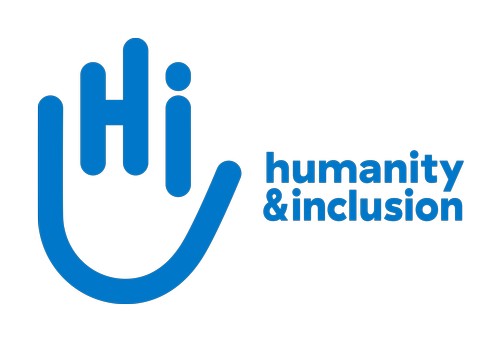Leave No Woman Behind!
DIWA and HI publish their African perspectives and good practices to inform the forthcoming CRPD Guidelines
25 November 2025, International day on the elimination of violence against women.
Disabled Women in Africa and HI-Making It Work publish a consolidated version of their two joint submissions made to the Committee on the Rights of Persons with Disabilities on 31 October 2025, in response to the call for written submissions on the guidelines on addressing multiple and intersectional forms of discrimination against women and girls with disabilities.
This report is structured in two complementary parts.
- The first presents the submission African Perspectives on Multiple and Intersectional Discrimination against Women and Girls with Disabilities, developed to provide localized, experience-based inputs to the questions raised by the CRPD Committee regarding the legal framework and the lived realities of women with disabilities in all their diversities. This section highlights how multiple and intersectional forms of discrimination manifest in the everyday lives of African women and girls with disabilities, grounding the analysis in their priorities and experiences.
- The second part, African Good Practices: Informing the CRPD Guidelines on Addressing Multiple and Intersectional Forms of Discrimination against Women and Girls with Disabilities, showcases a series of successful practices—mostly led by women-led OPDs and carried out in collaboration with State actors—that demonstrate concrete efforts to tackle these intersecting forms of discrimination. These practices are intended to inform the development of practical, action-oriented CRPD guidelines that can serve as a crucial tool for accelerating progress, given the urgency of the situation faced by women and girls with disabilities across the continent.
A huge thank you to the 17 partner organisations from 11 countries who are listed below.
DIWA and HI contribute to the CRPD Guidelines on addressing multiple and intersecting forms of discrimination against women and girls with disabilities
The Committee has decided to prepare Guidelines on addressing multiple and intersecting forms of discrimination against women and girls with disabilities in law, policy and practice. The objective is to further guide states parties and other duty bearers to address the implementation gaps and to collect a repository of good practices in addressing multiple and intersecting forms of discrimination against women and girls with disabilities.
On 31 October 2025, DIWA Disabled Women in Africa, HI - Making It Work with the contributions of OFAB, ONG Dedji (Benin), ABPDFH (Burundi), CBCHS (Cameroon), WODAO (Ghana), COVAW, UDPK, WCC (Kenya), NEGWDM (Malawi), AWWDI (Nigeria), UNABU (Rwanda), BCDC Ziguinchor, Wildaf (Senegal), APROFEHTO, AST (Togo), LIDDWA, MUDIWA (Uganda) have been submitting 2 major documents.
African Perspectives on Multiple and Intersectional Discrimination against women and girls with disabilities.
and African Good Practices: informing the CRPD guidelines on addressing multiple and intersectional forms of discrimination against women and girls with disabilities
They can be found hereafter in their short version.
#DisabledWomenEngage: This page is dedicated to advocacy initiatives led by women with disabilities.

Whether conducted by MIW or some of the women-led organizations we partner with, advocacy initiatives are slowly but surely upholding the rights of women with disabilities.
Bringing the gender perspective in the disability rights initiatives, as well as pushing for disability to be one of the discrimination factor taken into account in intersectional feminism: Women with disabilities are acting!
Find in this page some key resources and initiatives. Get inspired, use them, and get in touch if we can support. s.pecourt@hi.org
2024 Review of GBV policies in Africa: Still a long way to go!
There is no advocacy without analysing policy framework!
As one in five women is a woman living with a disability, yet very few policies are built to ensure and protect the rights of women with disabilities specifically. Although some policies entail inclusive measures, which deserve to be highlighted, this study sheds light on the huge lack of inclusion and equality of GBV policies.
The initial policy review was first carried out in 2020. At that time, inclusion, intersectionality and diversity were already at the forefront of the conversation. Although policies should be inclusive and protect those who face intersecting forms of discrimination, our study found that women with disabilities were invisible in two-thirds of GBV policies.
The updated review, published in 2024, sadly confirms that there is still a long way to go among the 31 GBV policies analysed across the African continent.
Beyond the bitter observation, this document aims to improve the inclusion of GBV policies. It gathers elements to guide policy makers on building stronger and more inclusive policies. We also hope that it will inspire women-led civil society organisations to review existing policies, because the better we assess exclusion, the more chance we have of addressing it.
Thanks and congratulations to Isabelle Lamaud for conducting this thorough update!
* August 2022: DIWA's instrumental role at the Pan African Parliament!
Disabled Women in Africa DIWA Malawi was invited at the sitting of the Committee on Genger, Family, Youth and People with Disability Affairs of the Pan African Parliament (PAP) on 25th of August, 2022.
Ruth Mkutumula, Country Director, delivered a powerful speech, this presentation being "an excellent opportunity to meaningfully promote and campaign for ratification and domestication of the African Disability Protocol and domestication of the PAP Model Law on Disability."
Following one of DIWA's recommendation, the PAP Committee announced the set up a “vital subcommittee” that is tasked with advancing advocacy strategy for the promotion of ratification of the Protocol and Domestication of the African Model Law on Disability". A major achievement where DIWA's action has been instrumental.
See at this link the Press Release of the Pan African Parliament.
Read the full text in accessible PDF hereafter.
* The 2018 AU Protocol: Intersectional, Progressive, a ground-breaking tool to advance the rights of women and girls with disabilities

In Africa, the gender legal framework does not sufficiently include women and girls with diverse identities. The new Protocol to the Charter on Human and Peoples' Rights on the Rights of Persons with Disabilities is ground-breaking: it offers a unique intersectional approach, it is a localized and progressive tool to uphold the rights of women and girls with disabilities.
Discover the Advocacy Tools we have developed to help you advocate for the rights of women and girls with disabilities. Use this Protocol to avance rights of women and girls in your country, call for ratification, demand new provisions to ensure women and girls with disabilities are better included, protected, heard!
Making It Work united with COVAW, FIDA-Kenya and UDPK to elaborate those 2 advocacy tools: the Protocol seen with a gender lens, the Protocol seen with an age lens.
Special thanks to Rebecca Andrews from Washington University, Seattle, USA.
AU Protocol: What's new for African Women with Disabilities?
These gender-focused advocacy tools (2 and 4 pages) will help you advocate and communicate around the new AU Protocol on the Rights of Persons with Disabilities. Learn and articulate how the Protocol is ground-breaking!
1 - Women with Disabilities are Uniquely Prioritized
2- Fighting Against Discrimination by Association
3- Protection from Harmful Practices
4 - Progressive Disability Inclusive Gender Perspectives
5 - Unprecedented Protection of Girls with Disabilities
You will find below the Gender focused advocacy tool (2 pages) along with 2 pages of more explanations to help you with in-depth advocacy - in the short 2 pages version or in the full 4 pages version.
AU Protocol: What's new for African Children, Youth, and Older Persons with Disabilities?
This 4-pages advocacy tool will help you advocate and communicate around the new AU Protocol on the Rights of Persons with Disabilities. Learn and articulate how the Protocol is ground-breaking!
1- Defending the Rights of African Children with Disabilities of the 21st Century
2- No Longer Ignored: Youth with Disabilities
3- Protecting the Growing Populations of Older Persons
You will find below the advocacy tool (2 pages) along with 2 pages of more explanations to help you with in-depth advocacy - in the short 2 pages version or in the full 4 pages version.
Advocacy for the ratification of the African Disability Protocol in Senegal by WILDAF
The Protocol to the African Charter on Human and Peoples Rights on the Rights of Persons with Disabilities has entered into force in May 2024. At the occasion of the Week of the Disability in Senegal, 3 to 10 December 2024, Wildaf Senegal and MIW join forces to ask for its ratification by the Governement of Senegal.
Wildaf has produced a simplified version of the Protocol to ease its appropriation by duty bearers, men and women with disabilities and all human rights activists willing to support this campaign.
Copyright © 2026. All rights reserved.
